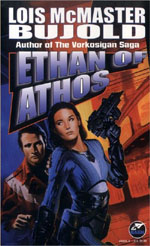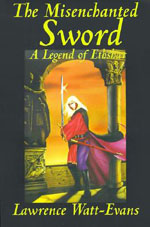 wirOne of the things I like best about Bujold is her uncanny ability to create and evoke alien cultures. (The fact that those cultures don’t actually involve aliens is inconsequential.) The real trick of it, I’ve decided, is that Bujold doesn’t make a big deal out of it. With most authors, every single difference is emphasized and analyzed and justified. The result feels inherently unnatural – partly because the author is making an elaborate production out of it, partly because the author is showing their hand at work, and often because the characters end up being far too self-aware. (Neither I, nor anyone I know, pauses to give elaborate, pseudo-science lectures on why 21st century Americans behave the way they do.)
wirOne of the things I like best about Bujold is her uncanny ability to create and evoke alien cultures. (The fact that those cultures don’t actually involve aliens is inconsequential.) The real trick of it, I’ve decided, is that Bujold doesn’t make a big deal out of it. With most authors, every single difference is emphasized and analyzed and justified. The result feels inherently unnatural – partly because the author is making an elaborate production out of it, partly because the author is showing their hand at work, and often because the characters end up being far too self-aware. (Neither I, nor anyone I know, pauses to give elaborate, pseudo-science lectures on why 21st century Americans behave the way they do.)
Bujold, by contrast, simply allows her characters to live in the cultures she creates. Perhaps even more importantly, she lets us see the universe of her story through the unfiltered eyes of her characters, without apology or explanation.
On this level, Ethan of Athos delivers in a big way. The colony of Athos was founded by patriarchs who believed, primarily, that women were a corrupting influence. Using uterine replicators, they successfully created an all-male society way out in the boondocks of civilized space. Now, however, problems have begun to appear: Their original ovarian cultures are dying out, and problems of limited diversity were rearing their head even before the most recent genetic crisis came to a head. Somebody needs to be sent out into the wider galactic community to purchase new genetic material for the colony, and that’s where Ethan comes in: He leaves on the annual galactic census ship on a secret, if somewhat unexciting, mission to save his world.
At which point he promptly falls into the middle of an espionage mission involving Elli Quinn (a delightful character familiar to those who have read Bujold’s other Vorkosigan books).
Coincidentally, this discussion of culture-building brings up something which consistently puzzles me: A lot of people seem to have the belief that Bujold’s work is light on the science fiction. Or, in other words, that her work only has a thin layer of science fiction thrown in to make them genre works. The only explanation I have for this belief is that Bujold is simply too subtle a writer for these people.
At first glance, Ethan of Athos is a simple adventure story starring a protagonist from an unusual culture. But take a closer look: That unusual culture is, in fact, a very sophisticated extrapolation of how technology will affect human society. And Bujold works in a complete analysis of the consequences and mindset of that culture, even while you’re busy turning the pages for the exciting payoffs of the adventure story – she just refuses to Emphasize It With Capital Letters and Long Speeches Explaining the Point.
And against all of this, Bujold weaves yet another theme: A softly-played, emotionally-packed character drama.
Which brings me to another thing that I like about Bujold: Her humor. It’s believable and real and rib-achingly funny. It’s the humor of actual people living in an actual world, and it demonstrates the vividness with which Bujold evokes her stories. And, like most living humor, its all about context. (You’ll see what I mean when you understand the line: “Apparently they had committees on Kline Station, too…”)
So, we’ve got great prose, keen foresights, a fully-realized world, compelling characters, and an exciting plot.
And this is one of Bujold’s weaker novels? There’s little doubt in my mind that she’s the best science fiction author writing today.
GRADE: A-
Lois McMaster Bujold
Publisher: 1986
Publisher: Baen Books
Cover Price: $5.99
ISBN: 0-671-65604-X


